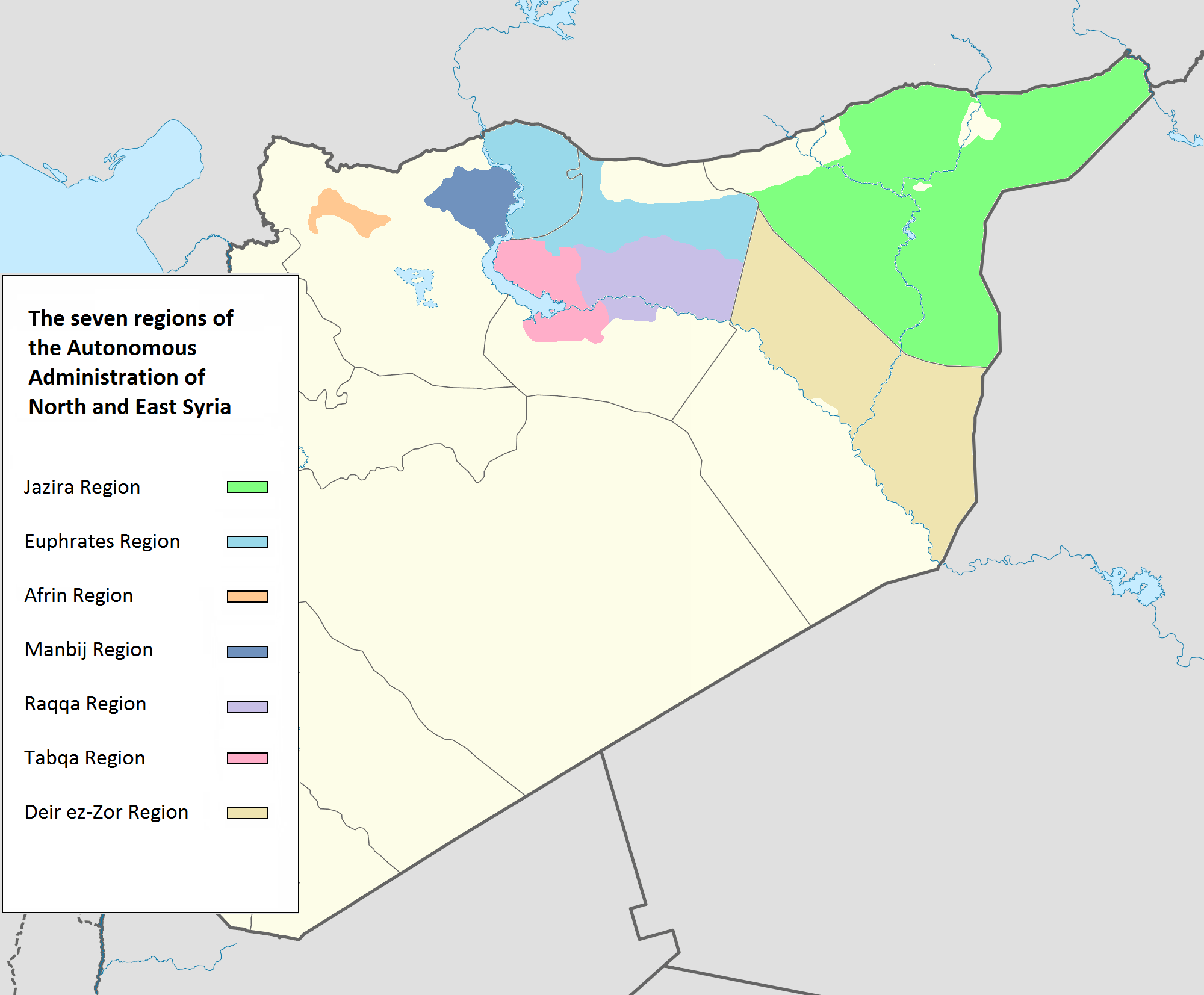More languages
More actions
| Autonomous Administration of North and East Syria Rêveberiya Xweser a Bakur û Rojhilatê Sûriyeyê الإدارة الذاتية لشمال وشرق سوريا | |
|---|---|
|
Flag | |
 | |
| Capital | Ayn Issa |
| Largest city | Raqqa |
| Official languages | Arabic Kurdish |
| Recognised regional languages | Adyghe Syriac Turkish |
| Dominant mode of production | Communism/Socialism (de jure) Capitalism (de facto) |
| Government | Libertarian Socialist confederation |
• Co-presidents | Îlham Ehmed Mansur Selum |
| History | |
• Transitional government declared | 2013 |
• New government declared | 6 September 2018 |
| Area | |
• Total | 50,000 km² |
| Population | |
• 2018 estimate | 2,000,000 |
The Autonomous Administration of North and East Syria (AANES), also known as Rojava, is an autonomous region in Syria. It is led by the Democratic Union Party (PYD) and other allied parties. Rojava has a defense force known as the SDF, which includes the YPG, a Kurdish militia.[1]
Economy
The AANES maintains a system of primarily private ownership of the means of production, making it effectively a decentralized capitalist economy,[1] with most of the economy being made up of the private and public sector. In 2012, after the implementation of the "People's Economy Plan" by the councils, private property and entrepreneurship are protected under the sovereign principle of “ownership by use”.[2] With a regional official stating that "The method in Rojava is not so much against private property, but rather has the goal of putting private property in the service of all the peoples who live in Rojava".[3]
While there's hundreds of small worker co-operatives, these play a minimal role in the economy of the region, with 12% of the economy in Jazira, the largest region of Northern Syria, being based on worker co-operatives,[3] with services such as gas and oil being operated mainly by private businesses. The major source of revenue for the AANES is not only taxes, but entrepeneurs, landlords, businessmen and venture capitalists, with these influencing government decisions and even maintaining high rank positions within it.[4]
Political Structure
While the official statement of the AANES is that all property is now controlled by communes and city councils, according to the Ministry of Economics, councils have only been set up for about one third of the enterprises in Rojava so far.[2] The power of communes is extremely limited, being only local issues or consultative functions. Above these are the councils, these are not working class councils but councils in which political parties, unions, professions and tribal leaders of local government branches are represented, with real state power being handled elsewhere.[4] The AANES in each region consists of a Supreme Constitutional Court, a High Electoral Commission, a Judicial Council, a Legislative Council and an Executive Council, with these being for the most part, appointed, not elected.[4]
Kurdish nationalism
The YPG assassinated Assyrian leader David Jindo in 2015 because he supported a united Syria and opposed Kurdish nationalism. In 2018, the PYD forced several Assyrian schools controlled by the Syrian Orthodox Church to close. Rojavan authorities published a book worshipping Kurdish warlord Simko Shakak who massacred Assyrian civilians.[1]
U.S. support
The SDF receives much of its arms from the United States and the U.S. has established seven military bases in the area.[1] The U.S. National Security Council called Rojava "another Israel in the region."[5]
References
- ↑ 1.0 1.1 1.2 1.3 "On Rojava and the Western Left" (2020-04-22). Line Struggle Collective. Archived from the original on 2022-01-28. Retrieved 2022-07-05.
- ↑ 2.0 2.1 A Small Key Can Open a Large Door: The Rojava Revolution (2015). Strangers In a Tangled Wilderness.
- ↑ 3.0 3.1 "Rojava – the formation of an economic alternative: Private property in the service of all" (2015-06-15). Co-operation in Mesopotamia.
- ↑ 4.0 4.1 4.2 "Sinan Hatahet, The Political Economy of the Autonomous Administration of North and East Syria". European University Institute.
- ↑ James Laporta (2019-07-10). "Exclusive: Official Who Heard Call Says Trump Got 'Rolled' By Turkey and 'Has No Spine'" Newsweek. Archived from the original on 2022-04-07. Retrieved 2022-07-05.

